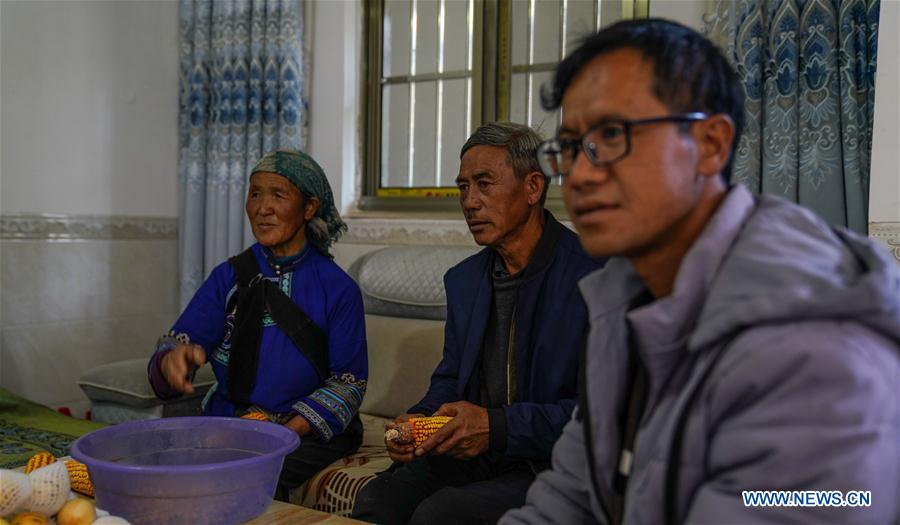

 |
| Villager Zhang Jianwei, his mother Huang Lanfang and father Zhang Guoxiang watch TV at home in Luhua Village of Xijiekou Town, Shilin Yi Autonomous County, southwest China''s Yunnan Province, Nov. 28, 2019. Rows of shrubs bearing pepino melons spread over the stony desert in Luhua Village in southwest China''s Yunnan. It is the outcomes for locals to fight against the harsh environment and a success to lead a better life. On this stony desert in Luhua Village, it was hard to grow crops in the past. Locals chose to plant the pepino melon which is suitable for the land here and wished to have a good sale. But the pepino melon originated from South America was unknown to most of the Chinese customers. No one bought the fruit after the harvest. Good news came and the situation has changed since the end of 2015. Promotions, part of the poverty alleviation campaign, were rolled out to help raise the popularity and sales of the fruit. This fruit, with a mixed flavor of honeydew and cucumber, is rich in nutrition. And it is recognized gradually by the Chinese who pay attention to their diet. Up to date, pepino melon planting area in Xijiekou Town has reached to 4800 hectares, with more than 4,000 families involved in this industry. The pepino melon planting industry has helped Zhang''s family and his fellow villagers get rid of poverty. The income of Zhang''s family in 2019 is expected to reach 100,000 yuan (about 14215 dollars). (Xinhua/Jigme Dorje) |

 Award-winning photos show poverty reduction achievements in NE China's Jilin province
Award-winning photos show poverty reduction achievements in NE China's Jilin province People dance to greet advent of New Year in Ameiqituo Town, Guizhou
People dance to greet advent of New Year in Ameiqituo Town, Guizhou Fire brigade in Shanghai holds group wedding
Fire brigade in Shanghai holds group wedding Tourists enjoy ice sculptures in Datan Town, north China
Tourists enjoy ice sculptures in Datan Town, north China Sunset scenery of Dayan Pagoda in Xi'an
Sunset scenery of Dayan Pagoda in Xi'an Tourists have fun at scenic spot in Nanlong Town, NW China
Tourists have fun at scenic spot in Nanlong Town, NW China Harbin attracts tourists by making best use of ice in winter
Harbin attracts tourists by making best use of ice in winter In pics: FIS Alpine Ski Women's World Cup Slalom
In pics: FIS Alpine Ski Women's World Cup Slalom Black-necked cranes rest at reservoir in Lhunzhub County, Lhasa
Black-necked cranes rest at reservoir in Lhunzhub County, Lhasa China's FAST telescope will be available to foreign scientists in April
China's FAST telescope will be available to foreign scientists in April